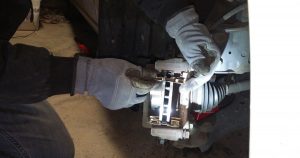
Cars are one of the most essential parts of our daily lives. We rely on them heavily, and sometimes the constant use takes its toll on our vehicles. Everyday wear and tear can cause parts to break down, including your brakes. Here are four warning signs that it’s time for new brake pads for your car.
1. Brake Light is On
The most obvious sign that points towards problems with your brakes is when your brake light is on. While it may simply be indicating your parking brake is engaged, it could also be a sign of something more serious.
Be sure to fully release the parking brake to see if this causes the light to go out. If the brake light stays on, the car is signaling to you that there is a problem with the brakes and that they should be checked out by a professional.
2. Squealing, Squeaking, or Grinding Noises
If you are hearing a metallic squeal while driving, turn down your heavy metal playlist. If you still hear the metallic squeal after that, this is your brake pad wear indicator. The brake pad indicators are made of steel, causing them to make a high-pitched noise when they come in contact with the rotor. Make sure to get new brake pads as soon as possible, so that rotor damage does not occur. The continual rubbing of the steel on the rotors causes expensive rotor damage.
3. Vibration, Wobbling, or Scraping When Braking
If any strange noise or feeling occurs when braking, this could also point to a need for new brake pads. Shuddering of the steering wheel can be due to an uneven rotor. Brake pads hug the rotors when brakes are applied. This causes the rotors to slow down and eventually stop altogether. It is common for rotors to have slight grooves as a result of constant braking. However, if one rotor develops deeper cuts, steering wheel vibration will start to occur.
4. Leaking Fluid
Leaking fluid is another telltale sign that you may need your brake pads checked. This fluid, called brake fluid, is what gives power to your brakes. The master cylinder is the catalyst that causes the brake pads to clamp down on the rotors. The brake fluid creates hydraulic pressure by being pushed through thin piping that presses down on the brake pads. If there is not enough fluid, there won’t be enough pressure to secure the rotors between the pads firmly. It is essential to check the level of your brake fluid on a regular basis to prevent this from happening.
Many signs point to a need for a brake pad check-up. These four examples are important to remember, especially now that summer is in full swing. Stay safe by making sure not to push off any brake pad maintenance. The service team at Davis-Moore Mazda knows how important brakes are to a vehicle. Call or stop by to schedule routine maintenance or service with them today.
Image via Flickr by YOUCANIC




